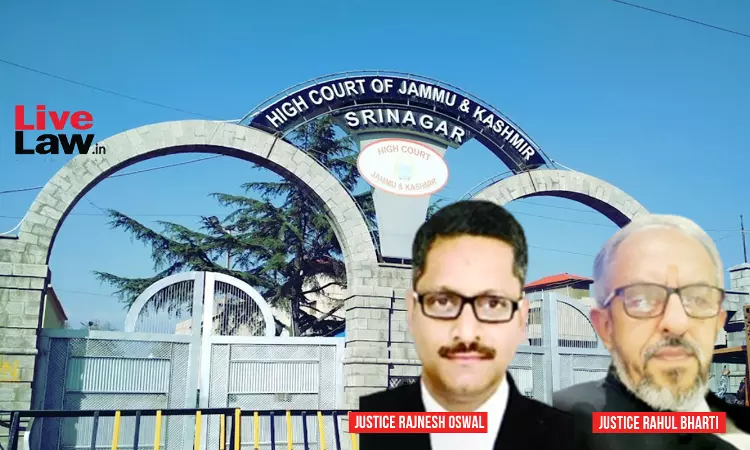- Home
- /
- High Courts
- /
- High Court of J & K and Ladakh
- /
- Exclusive Jurisdiction Clause Is...
Exclusive Jurisdiction Clause Is Enforceable Only If Chosen Court Is Competent U/S 20 CPC At Time Of Contract: J&K&L High Court
LIVELAW NEWS NETWORK
27 Oct 2025 7:45 PM IST
Reiterating a fundamental principle of civil jurisdiction, the High Court of Jammu and Kashmir and Ladakh at Jammu has held that parties cannot, by design or default, confer jurisdiction on a court that inherently lacks it. An exclusive jurisdiction clause is enforceable only if the chosen court was competent under Section 20 CPC at the time of the contract, it added.The Division Bench...
Reiterating a fundamental principle of civil jurisdiction, the High Court of Jammu and Kashmir and Ladakh at Jammu has held that parties cannot, by design or default, confer jurisdiction on a court that inherently lacks it. An exclusive jurisdiction clause is enforceable only if the chosen court was competent under Section 20 CPC at the time of the contract, it added.
The Division Bench comprising Justice Rajnesh Oswal and Justice Rahul Bharti made these observations while allowing a civil miscellaneous appeal filed by Pal Sales and Services Pvt. Ltd. against Daimler India Commercial Vehicles Pvt. Ltd., wherein the Commercial Court at Jammu had returned the plaint for presentation before the courts at Chennai on the ground of lack of territorial jurisdiction.
Background:
This dispute arose when Pal Sales and Services Pvt. Ltd. (Appelant) signed a Dealer Agreement in Delhi with Daimler India Commercial Vehicles Pvt. Ltd., (Respondent) becoming a non-exclusive dealer for Daimler's vehicles and parts in Jammu & Kashmir and Ladakh.
In February 2025, Pal Sales sued Daimler in Jammu's Commercial Court, claiming ₹35.65 crores for breach of contract, seeking to void a show-cause notice, and requesting an injunction against dealership termination or new appointments.
Daimler invoked Article 17 of the agreement, which gave Chennai courts exclusive jurisdiction, and filed under Order VII Rules 10 and 11 CPC. The Jammu court agreed and returned the plaint for filing in Chennai.
Pal Sales appealed to the High Court, arguing no cause of action arose in Chennai and that the jurisdiction clause was void, as Chennai courts lacked territorial jurisdiction under Section 20 CPC.
Courts Observations:
Justice Rajnesh Oswal, writing the judgment for the Bench, conducted a meticulous examination of the Dealer Agreement, the relevant statutory framework, and the judicial precedents governing territorial jurisdiction and exclusive jurisdiction clauses.
At the heart of the controversy was Article 17 of the Dealer Agreement, which stated:
“All disputes, controversies or claims arising from the interpretation, performance or non-performance of this Agreement or any and all transactions related to this Agreement shall be submitted to the exclusive Courts at Chennai, which will have exclusive jurisdiction over disputes between the parties arising under, or relating to this Agreement.”
The Court observed that while parties to a contract may choose one among multiple competent forums, they cannot create jurisdiction by consent in a court that inherently lacks it. Referring to Section 20 of the Code of Civil Procedure, the Bench reiterated that a suit must be instituted in a court within whose jurisdiction the defendant resides, carries on business, or where the cause of action arises.
“It is surely not open to the parties to confer jurisdiction by their agreement, knowingly or unknowingly, on a court which it does not possess under the Code of Civil Procedure,” the Bench observed.
The Court also undertook a detailed legal analysis of the Madras High Court (Jurisdictional Limits) Act, 1927, the Madras High Court (Jurisdictional Limits) Extension Act, 1985, and the Chennai City Civil Court Act, 1892 and maintained that judicial jurisdiction is governed strictly by statutory instruments and cannot be altered by executive orders or notifications.
Consequently, the Bench held that Perungudi, being situated in the Chengalpattu Judicial District, did not confer jurisdiction upon the Chennai Civil Courts.
The Court then proceeded to analyse the validity of the exclusive jurisdiction clause under Article 17 and articulated a lucid threefold test after referring to various precedents.
“For an exclusive jurisdiction clause to be valid, it must be (a) in consonance with Section 28 of the Contract Act, i.e., not restricting legal recourse; (b) the chosen court must be competent to have such jurisdiction in the first place; and (c) the parties must either expressly or impliedly confer jurisdiction on such court.”, the court maintained.
Applying this test, the Court held that since no part of the cause of action arose in Chennai and the respondent's offices fell outside Chennai's judicial limits, the clause conferring exclusive jurisdiction upon Chennai courts was void and unenforceable.
Finding serious fault with the approach of the Commercial Court at Jammu in returning the plaint the court stated that the trial court had failed to identify which specific court in Chennai possessed jurisdiction and had instead issued a vague direction to file the plaint before the “appropriate court at Chennai. Accordingly, the Court concluded that the order of the trial court was unsustainable in law.
Holding that the suit could have been filed only before the competent courts at Kanchipuram, Chengalpattu, or Jammu, where the cause of action had accrued, the Bench set aside the impugned order and remanded the matter back to the Commercial Court at Jammu for disposal in accordance with law.
The Court also restored the interim directions earlier granted by the trial court and directed it to dispose of the application for interim relief within the statutory period, cautioning against unnecessary adjournments.
Case Title: Pal Sales & Service Vs Dialmer India Commercial Vehicles Pvt Ltd.
Citation: 2025 LiveLaw (JKL)
Click Here To Read/Download Judgment



